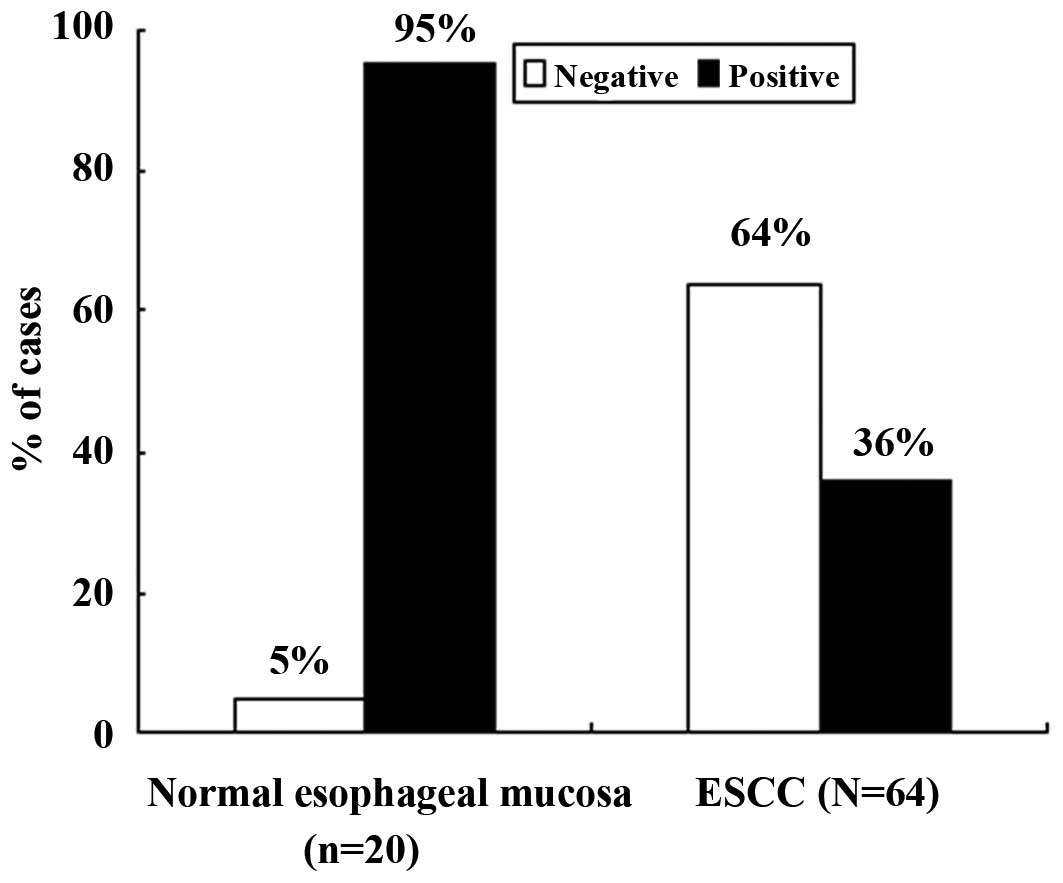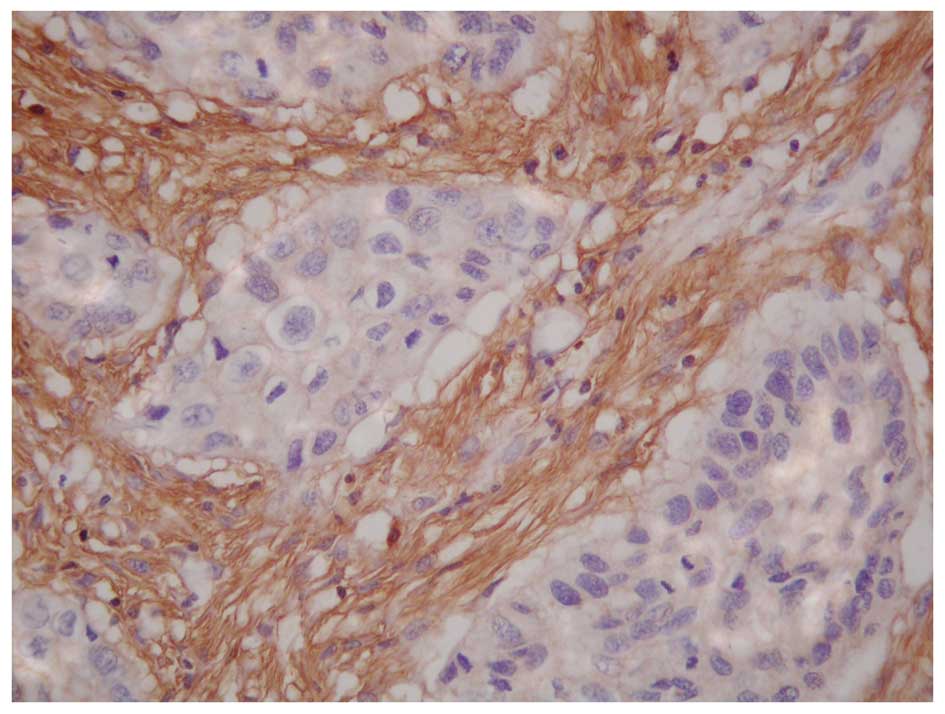|
1
|
Wu ZB and Yang GH: Chinese Surgical
Pathology. People’s Health Press; Beijing: pp. 619–627. 2002
|
|
2
|
Garkavtsev I, Kazarov A, Gudkov A and
Riabowol K: Suppression of the novel growth inhibitor
p33ING1 promotes neoplastic transformation. Nat Genet.
14:415–420. 1996. View Article : Google Scholar : PubMed/NCBI
|
|
3
|
Nagashima M, Shiseki M, Miura K, et al:
DNA damage-inducible gene p33ING2 negatively regulates cell
proliferation through acetylation of p53. Proc Natl Acad Sci USA.
98:9671–9676. 2001. View Article : Google Scholar : PubMed/NCBI
|
|
4
|
Shimada Y, Saito A, Suzuki M, Takahashi E
and Horie M: Cloning of a novel gene (ING1L) homologous to ING1, a
candidate tumor suppressor. Cytogenet Cell Genet. 83:232–235. 1998.
View Article : Google Scholar : PubMed/NCBI
|
|
5
|
Nagashima M, Shiseki M, Pedeux RM, et al:
A novel PHD-finger motif protein, p47ING3, modulates p53-mediated
transcription, cell cycle control, and apoptosis. Oncogene.
22:343–350. 2003. View Article : Google Scholar : PubMed/NCBI
|
|
6
|
Shiseki M, Nagashima M, Pedeux RM, et al:
p29ING4 and p28ING5 bind to p53 and p300, and enhance p53 activity.
Cancer Res. 63:2373–2378. 2003.PubMed/NCBI
|
|
7
|
Nouman GS, Anderson JJ, Crosier S,
Shrimankar J, Lunec J and Angus B: Downregulation of nuclear
expression of the p33ING1b inhibitor of growth protein
in invasive carcinoma of the breast. J Clin Pathol. 56:507–511.
2003.PubMed/NCBI
|
|
8
|
Saito A, Furukawa T, Fukushige S, Koyama
S, Hoshi M, Hayashi Y and Horii A: p24/ING1-ALT1 and p47/ING1-ALT2,
distinct alternative transcripts of p33/ING1. J Hum Genet.
45:177–181. 2000. View Article : Google Scholar : PubMed/NCBI
|
|
9
|
Nouman GS, Anderson JJ, Lunec J and Angus
B: The role of the tumor suppressor p33 ING1b in human neoplasia. J
Clin Pathol. 56:491–496. 2003. View Article : Google Scholar : PubMed/NCBI
|
|
10
|
Nouman GS, Angus B, Lunec J, Crosier S,
Lodge A and Anderson JJ: Comparative assessment expression of the
inhibitor of growth 1 gene (ING1) in normal and neoplastic tissue.
Hybridoma Hybridomics. 21:1–10. 2002. View Article : Google Scholar : PubMed/NCBI
|
|
11
|
Zhang JT, Wang DW, Li QX, et al: Nuclear
to cytoplasmic shift of p33ING1b protein from normal
oral mucosa to oral squamous cell carcinoma in relation to
clinicopathological variables. J Cancer Res Clin. 134:421–426.
2008.PubMed/NCBI
|
|
12
|
Oki E, Maehara Y, Tokunaga E, Kakeji Y and
Sugimachi K: Reduced expression of p33ING1 and the
relation with p53 expression in human gastric cancer. Cancer Lett.
147:157–162. 1999.
|
|
13
|
Kameyama K, Huang CL, Liu D, et al:
Reduced ING1b gene expression plays an important role in
carcinogenesis of non-small cell lung cancer patients. Clin Cancer
Res. 9:4926–4934. 2003.PubMed/NCBI
|
|
14
|
Nouman GS, Anderson JJ, Wood KM, Lunec J,
Hall AG, Reid MM and Angus B: Loss of nuclear expression of the
p33ING1b inhibitor of growth protein in childhood acute
lymphoblastic leukaemia. J Clin Pathol. 55:596–601. 2002.PubMed/NCBI
|
|
15
|
Vieyra D, Senger DL, Toyama T, et al:
Altered subcellular localization and low frequency of mutation of
ING1 in human brain tumors. Clin Cancer Res. 9:5952–5961.
2003.PubMed/NCBI
|
|
16
|
Li X, Nishida T, Noguchi A, et al:
Decreased nuclear expression and increased cytoplasmic expression
of ING5 may be linked to tumorigenesis and progression in human
head and neck squamous cell carcinoma. J Cancer Res Clin.
136:1573–1583. 2010. View Article : Google Scholar : PubMed/NCBI
|
|
17
|
Rearden A: A new LIM protein containing an
autopitope homologous to ‘senescent cell antigen’. Biochem Biophys
Res Commun. 201:1124–1134. 1994.
|
|
18
|
Wu C: PINCH, N(i)ck and the ILK: network
wiring at cell-matrix adhesions. Trends Cell Biol. 15:460–466.
2005. View Article : Google Scholar : PubMed/NCBI
|
|
19
|
Tu Y, Li F, Goicoechea S and Wu C: The
LIM-only protein PINCH directly interacts with integrin-linked
kinase and is recruited to integrin-rich sites in spreading cells.
Mol Cell Biol. 19:2425–2434. 1999.PubMed/NCBI
|
|
20
|
Wang-Rodriquez J, Dreilinger AD, Alsharabi
GM and Rearden A: The signaling adapter protein PINCH is
up-regulated in the stroma of common cancer, notably at invasive
edges. Cancer. 95:1387–1395. 2002. View Article : Google Scholar : PubMed/NCBI
|
|
21
|
Gao J, Arbman G, Readen A and Sun XF:
Expression of PINCH protein is an independent prognostic factor in
colorectal cancer patients. Neoplasia. 6:796–801. 2004. View Article : Google Scholar
|
|
22
|
Zhao ZR, Zhang ZY, Cui DS, Li J, Zhang HJ,
Wang MW and Sun XF: Particularly interesting new cysteine-histidine
rich protein expression in colorectal adenocaccinomas. World J
Gastroenterol. 12:298–301. 2006.PubMed/NCBI
|
|
23
|
Wang MW, Gu P, Zhang ZY, Zhu ZL, Li YH,
Zhao HM and Sun XF: Expression of PINCH protein in gliomas and its
clinicopathological significance. Oncology. 72:343–346. 2007.
View Article : Google Scholar : PubMed/NCBI
|
|
24
|
Zhang JT, Li QX, Wang DW, et al:
Upregulation of PINCH in the stroma of oral squamous cell carcinoma
predicts nodal metastasis. Oncol Rep. 14:1519–1522. 2005.PubMed/NCBI
|
|
25
|
Yan BY, Wang DW, Zhu ZL, et al:
Overexpression of MAC30 in the cytoplasm of oral squamous cell
carcinoma predicts nodal metastasis and poor differentiation.
Chemotherapy. 56:424–428. 2010. View Article : Google Scholar : PubMed/NCBI
|
|
26
|
Zhu Z, Yang Y, Zhang Y, et al: PINCH
expression and its significance in esophageal squamous cell
carcinoma. Dis Markers. 25:75–80. 2008. View Article : Google Scholar : PubMed/NCBI
|
|
27
|
Zhang HZ, Li XH, Zhang X, et al: PINCH
protein expression in normal endometrium, atypical endometrial
hyperplasia and endometrioid endometrial carcinoma. Chemotherapy.
56:291–297. 2010. View Article : Google Scholar
|
|
28
|
Hwang RF, Moore T, Arumugam T, et al:
Cancer-associated stromal fibroblasts promote pancreatic tumor
progression. Cancer Res. 68:918–926. 2008. View Article : Google Scholar : PubMed/NCBI
|
|
29
|
Nouman GS, Anderson JJ, Mathers ME,
Leonard N, Crosier S, Lunec J and Angus B: Nuclear to cytoplasmic
compartment shift of the p33ING1b tumor suppressor protein is
associated with malignacy in melanocytic lesions. Histopathology.
40:360–366. 2002. View Article : Google Scholar : PubMed/NCBI
|
|
30
|
Hoque MO, Kawamata H, Nakashiro K, et al:
Dysfunction of the p53 tumor suppressor pathway in head and neck
cancer. Int J Oncol. 21:119–126. 2002.PubMed/NCBI
|
|
31
|
Luo ZG, Tang H, Li B, Zhu Z, Ni CR and Zhu
MH: Genetic alterations of tumor suppressor ING1 in human non-small
cell lung cancer. Oncol Rep. 25:1073–1081. 2011.PubMed/NCBI
|
|
32
|
Garkavtsev I, Grigorian IA, Ossovskaya VS,
Chernov MV, Chumakov PM and Gudkov AV: The candidate tumor
suppressor p33ING1 cooperates with p53 in cell growth
control. Nature. 391:295–298. 1998. View
Article : Google Scholar
|
|
33
|
Gong W, Russel M, Suzuki K and Riabowol K:
Subcellular targeting of p33ING1b by phosphorylation-dependent
14-3-3 binding regulates p21WAF1 expression. Mol Cell Biol.
26:2947–2954. 2006. View Article : Google Scholar : PubMed/NCBI
|
|
34
|
Hermeking H and Benzinger A: 14-3-3
proteins in cell cycle regulation. Semin Cancer Biol. 16:183–192.
2006. View Article : Google Scholar : PubMed/NCBI
|
|
35
|
Russell MW, Soliman MA, Schriemer D and
Riabowol K: ING1 protein targeting to the nucleus by karyopherins
is necessary for activation of p21. Biochem Bioph Res Commun.
374:490–495. 2008. View Article : Google Scholar : PubMed/NCBI
|
|
36
|
Han X, Feng X, Rattner JB, et al:
Tethering by lamin A stabilizes and targets the ING1 tumor
suppressor. Nat Cell Biol. 10:1333–1340. 2008. View Article : Google Scholar : PubMed/NCBI
|
|
37
|
Li XH, Kikuchi K and Takanol Y: ING genes
work as tumor suppressor genes in the carcinogenesis of head and
neck squamous cell carcinoma. J Oncol. 2011:9636142011.PubMed/NCBI
|

















